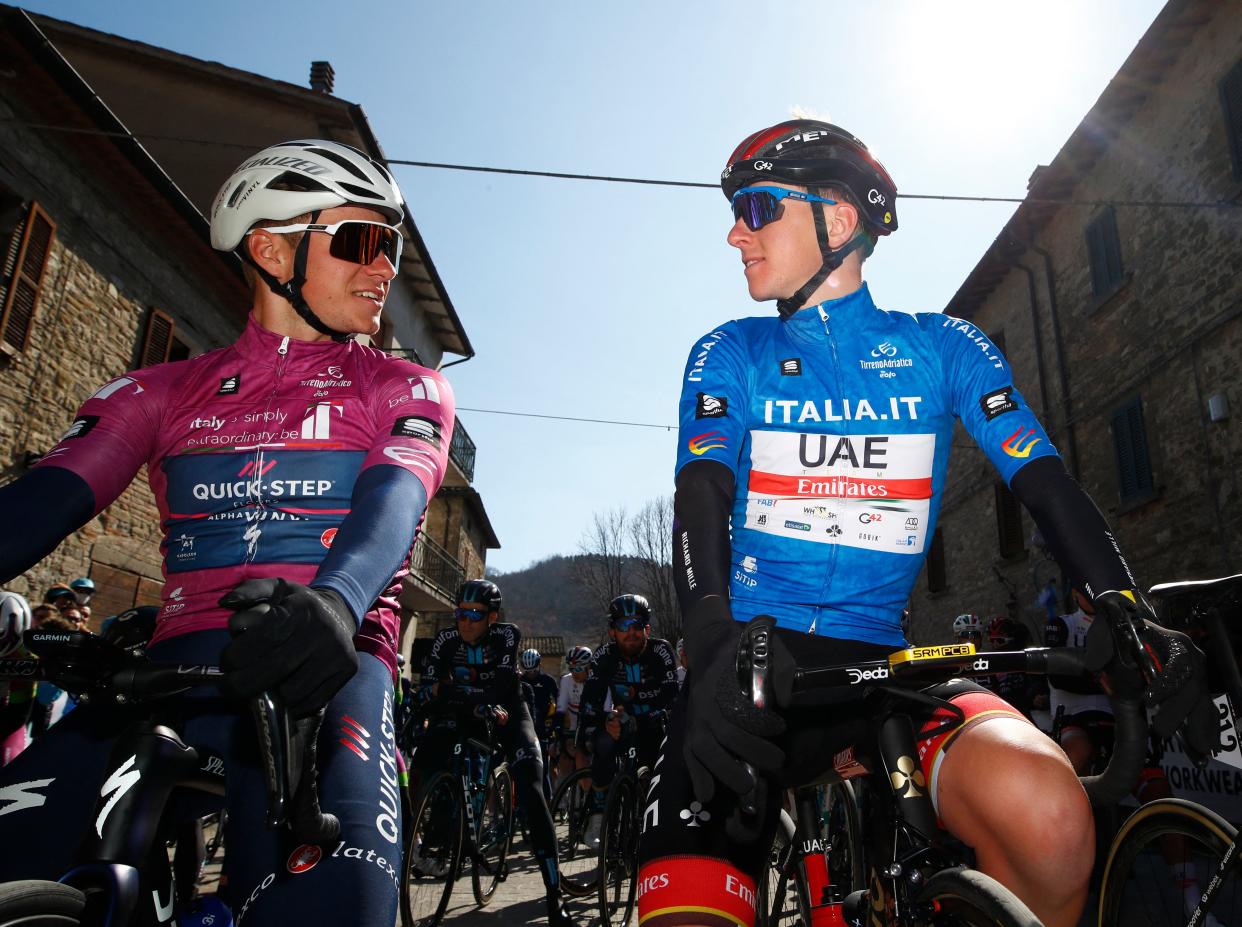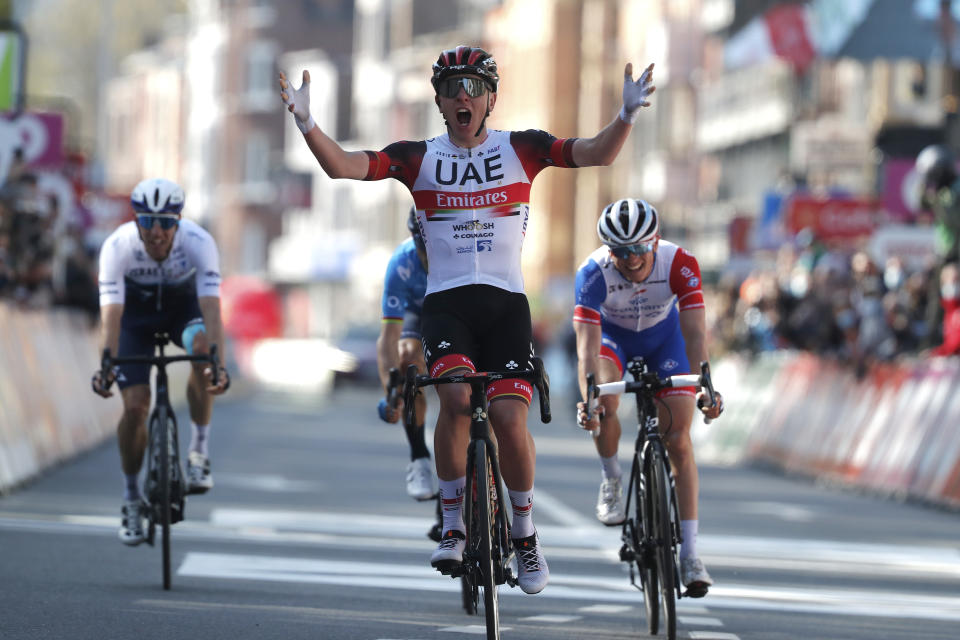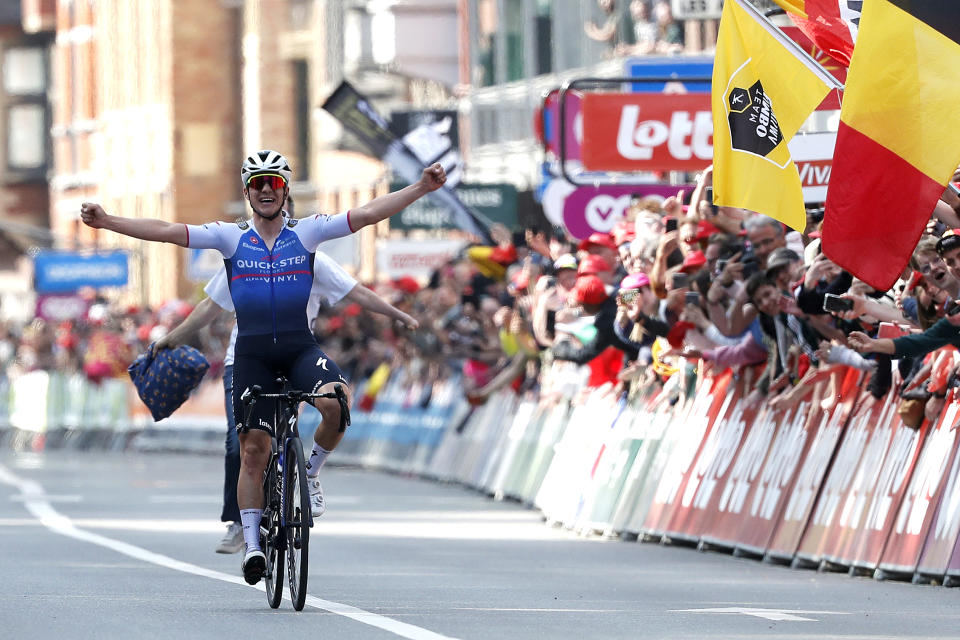A duel delayed - Tadej Pogacar and Remco Evenepoel face off at Liège-Bastogne-Liège

- Oops!Something went wrong.Please try again later.
Hold onto your hats: cycling’s oldest Classic, Liège-Bastogne-Liège is set to see two of its brightest young stars, Remco Evenepoel and Tadej Pogačar, do battle this Sunday in what is set to be one of the most keenly anticipated duels of the entire season.
A face-off between two of the most charismatic champions of the current peloton in a race as demanding and prestigious as Liège-Bastogne-Liège would be attractive enough no matter what. But the cycling planets have aligned in other ways to heighten the intensity of this particular battle.
Pogačar’s stunning sequence of success this Spring and Soudal-QuickStep’s desperate need for Evenepoel to save their disappointing Classics season at the last, just like last year, are just two of the additional factors deepening the drama.
But so too is the fact that Liège is Pogačar and Evenepoel’s first head-to-head encounter since the Belgian became world champion last September in Australia – and it’s almost certainly their only duel until Evenepoel puts his rainbow jersey on the line this summer.
Read more
Liege-Bastogne-Liege 2023: The Essential Guide
Remco Evenepoel keeps training secret ahead of Liège-Bastogne-Liège defence
La Flèche Wallonne: Tadej Pogacar puts hammer down on Huy for victory
The Tour de France is Pogačar’s overriding goal this year, but he has already done more in a few weeks this Spring than most riders manage in a career. With so many victories already, the question has become not so much if he will win, but who can stop him?
For Evenepoel, next month’s Giro d’Italia is a bigger prize than repeating at Liège-Bastogne-Liège. But as defending world champion, and racing on Belgian soil for the first time this season, Liège remains a hugely important landmark for Evenepoel in a year where wearing the rainbow jersey gives his achievements – and failures – added resonance. The chance to defeat Pogačar is, given his track record in 2023, an opportunity that he cannot afford to miss.
Both riders are victims of their own success, then. ‘Stop winning,’ was Evenepoel’s ironic plea to Pogačar back in March after the Slovenian’s devastating start to the season. But Pogačar paid no attention to Evenepoel’s request and instead continued to gobble up the victories.
Pogačar had already become the fourth rider in history and the first since Philippe Gilbert to take the Tour Flanders and Amstel Gold Race in the same year. Victory in Liège-Bastogne-Liège would put him on a par with Eddy Merckx in 1975, but not even the Cannibal himself won Paris-Nice and Flèche Wallonne that season as Pogačar has also done. Victory here would give Pogačar even greater momentum towards the Tour de France.

There are plenty more records that would be equalled or beaten if Pogačar repeats his 2021 win on Sunday. He’d be the first male rider to take all three Ardennes Classics (although strictly speaking Amstel is not part of the Ardennes, but the Limbourg hills) since Philippe Gilbert in 2011 and the first to take the Flèche-Liège double since Alejandro Valverde in 2017. He’d also become the only rider in the current peloton to have five or more Monument wins.
Yet standing in Pogacar’s way is not only one of the hardest courses of any Classic, with its 4,500 metres of vertical climbing. There is also the question question of how long his remarkable arc of top form can continue.
In the Amstel Gold Race, his final breakaway seemed almost to falter at times as a largely unheralded challenger, Ben Healy (EF Education-EasyPost) held him at nearly 30 seconds for much of the finale. But any dip in intensity could also be explained, at least partly, by the sheer ferocity of Pogačar’s earlier attacks and his generous collaboration in a break that was only 30 to 45 seconds ahead of its pursuers for many kilometres.
Sunday will reveal, among other things, if Amstel’s finale was a brief wavering in the power of Pogacar’s relentless search for victories, or the beginning of a downward curve as he reaches the final challenge of a Spring that started way back in Andalucia in mid-February with a solo victory in the Clásica Jaén.
Enter Evenepoel
The other factor, of course, is that Pogačar has not yet faced Evenepoel, an allrounder who has been running through the scales to impressive effect himself this Spring, winning the UAE Tour and engaging in a hugely entertaining – and high-quality – joust with Primoz Roglič at the Volta a Catalunya.
Evenepoel’s victory in Liège-Bastogne-Liège last season was not only striking because he saved his team’s Classics campaign. The manner of the victory itself – a 29km solo effort from the top of La Redoute – also represented a colossal break with the race’s recent tradition, where small group sprints (such as the one taken by Pogačar in 2021) or late solo efforts had been the order of the day.
It showed, in fact, precisely the kind of panache that has been at the heart of so many of Pogačar’s Classic wins. Like Pogacar at Strade Bianche or Amstel, it was a long-distance move that left the opposition in tatters and which seemed gloriously heedless of the inherent risks of such an effort.
Evenepoel’s Liège win was an echo of his 2019 Clasica San Sebastian triumph, but it also served as a preview of his greatest feat to date, the solo exploit that landed the world title in Wollongong last year.
It all serves to make Sunday’s race even more intriguing, and begs a tantalising question – is Evenepoel capable of ‘out-Pogačar-ing’ even Pogačar himself?

There is also a welcome degree of novelty to this duel, as Pogacar pointed out after Amstel Gold Race: “We have not often raced against each other at the top level. When we raced together, he won every time and I was far behind.”
As an in-depth comparison on Sporza showed, however, there have been relatively few direct standoffs. Pogačar abandoned when Evenepoel won in San Sebastian in 2019 and 2022, for instance. The Belgian, meanwhile, made little impact when Pogačar took bronze at the Tokyo Olympics, while the Slovenian was in another class at last year’s Tirreno-Adriatico. The anticipated duel at the UAE Tour in February was postponed when Pogačar opted to start his season in Spain instead.
And so Liège-Bastogne-Liège is the first occasion when both Pogačar and Evenepoel line up in the same race as the two outstanding favourites. Each man sets out from Liège flanked by a strong team and both have a penchant for long-distance attacks, though Pogačar’s track record in small group sprints is superior.
In any case, both riders are riding at levels that, with no disrespect to the other Liège contenders, will likely put the two of them in a league of their own. Both have already won cycling’s most venerable Monument, and both enter the race with justifiable confidence.
Something has to give. But whatever the result on Sunday, this is surely only the beginning of a duel that could run and run.

